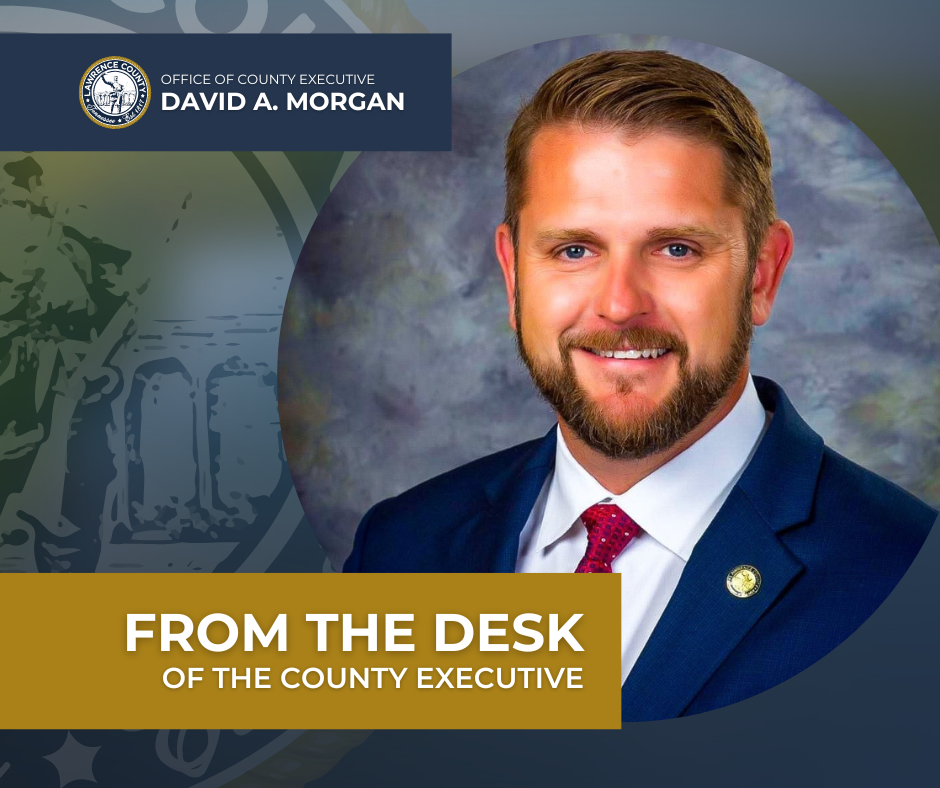Whether you’re a farmer or not, there are issues surrounding agriculture on state and national government levels that can affect your quality of life. This is especially true for Lawrence County, Tennessee, where agriculture is the biggest economic driver on state and local levels.
I’m honored to be the only Tennessee member of the National Association of Counties (NACo) Agriculture & Rural Affairs Steering Committee.

I recently returned from the NACo conference in Washington, DC, where seven of our committee met around the “Kitchen Table” with the Senate’s Agriculture Steering Committee chair, Michigan Senator Debbie Stabenow. The conference table earned its nickname because every federal policy decision regarding food – from its cultivation to SNAP benefits – is discussed around it.
Our group talked with Sen. Stabenow and other Senate and House leaders about issues affecting our communities and topics of national concern, including broadband access in rural America, rural entrepreneurship, and wastewater infrastructure.
Of real interest to me and many other county leaders are discussions around preservation of farmland in light of industrial and residential expansion. The nation’s population is growing, so it’s only natural that the amount of open land is diminishing. It’s just happening faster in Middle Tennessee than we’ve been accustomed to.
Balancing industrial/residential development and agriculture preservation is tricky. We want the jobs that development creates, but still want to maintain our small town/rural identity. We also have to keep in mind that individual landowners can do what they want with their property, and that includes selling it to a developer.
The American Farm Bureau Association is right in the middle of these discussions, and the Tennessee Farm Bureau is putting its full support behind some interesting bills currently under consideration in our State Legislature. I think they are important, so I’m putting them out for your information.
HJR81 is a joint House and Senate resolution calling for an amendment to the state constitution prohibiting collection of a statewide property tax, which would be in addition to local property taxes. This has not been collected in Tennessee since the 1940s but without an amendment remains an option. Changing the constitution is a multi-year process, calling for a simple majority approval in the General Assembly, then a two-thirds majority approval, then placement on a ballot for voter approval. I am definitely not in favor of more taxation, and I know you aren’t, either.
SB2099/HB1890 would create a $25 million Farmland Preservation Fund to be administered by the Tennessee Department of Agriculture. The fund would be used to help landowners enroll their farm or forest land into a program to preserve its use for 15 years or more. If passed, it takes effect July 1, 2024. I know the ability to address a property’s use, even after its current owner’s death, would put many minds at ease.
SB2486/HB2496 call for implementation of findings in a TACIR (Tennessee Advisory Commission on Intergovernmental Relations) study related to large-scale and residential solar energy development. It would allow solar facilities to be developed on brownfields (land contaminated by chemicals) and increase anti-fraud protection for homeowners investing in solar power. Several solar power companies have expressed interest in building facilities in Lawrence County, but none have yet followed through.
SB1659 /HB2054 would increase the maximum number of acres an individual property owner can enroll in the Greenbelt program from 1,500 to 5,000. The Greenbelt program gives a 30% property tax break on properties of 15 acres or more that are used for forestry or agriculture purposes. Property Assessor Brady Hutton tells me there are 25,644 total parcels of land in Lawrence County, ranging from less than an acre to 1,500. Of those, just 5.2%, or 4,930, are in the Greenbelt program.
Highlights from the proposed 2024-25 state Agriculture budget include full funding for the Tennessee Agricultural Enhancement Program (TAEP), which has benefitted many local producers. It designates a non-recurring $13 million for the Agricultural Enterprise Fund, which awards grants to beginning or expanding agricultural, food, and forestry businesses. It also calls for an annual increase for state agriculture lab operations, which analyze the quality of feed, fertilizer, and food. Other subjects under discussion by state lawmakers are livestock health, cybersecurity, wetlands, whole milk in our schools, and biodiesel fuels.
One of the challenges of being a government official is learning how to preserve tradition while embracing opportunity. It’s inevitable that the two will overlap along the way, creating a natural tension. Tension is not always bad, it gives us the ability to reassess and grow in the right direction as a community. I am fully committed to our agricultural community as well as open to new opportunities for us all. My privilege as County Executive is to be able to work between the two paradigms to produce the best future for us all.


